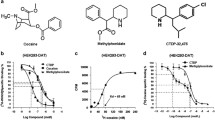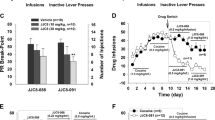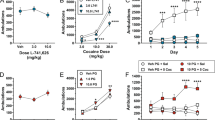Abstract
Rationale. The illicit use of cocaine is a persistent health problem worldwide. Currently, there are no broadly effective pharmacotherapies to treat cocaine addiction. A prerequisite for development of useful anti-cocaine medications is an understanding of the pharmacological basis of cocaine's effects. The functional analysis of behavior in laboratory animals has allowed for the development of strategies identifying candidate medications to treat cocaine addiction.
Objectives. This review summarizes the current status of dopaminergic compounds as cocaine pharmacotherapies in animal models of cocaine addiction.
Results. Maintenance medications should share key subjective effects with cocaine, yet have limited abuse liability and side effects. However, maintenance medications often have reinforcing effects that could contribute to abuse potential and side effects that could deter patient compliance. Combined with cocaine, these drugs enhance cocaine's effects. Cocaine antagonists should block the effects of cocaine and have no cocaine-like effects or side effects on their own. However, the cocaine-modulating effects of candidate cocaine antagonists are often surmountable, and, on their own, these drugs produce severe motoric side effects. In contrast, dopamine (DA) partial agonists should exhibit reduced abuse potential relative to agonists, as well as less severe motoric effects relative to antagonists. Combined with cocaine, these drugs should antagonize cocaine's effects.
Conclusions. DA partial agonists, in particular the D3-selective and the D1-like partial agonists, offer a more encouraging profile for novel anti-cocaine medications. Neither class of drug is self-administered, and side effects are often less severe and only observed at doses above those that antagonize the effects of cocaine.
Similar content being viewed by others
Author information
Authors and Affiliations
Additional information
Electronic Publication
Rights and permissions
About this article
Cite this article
Platt, D.M., Rowlett, J.K. & Spealman, R.D. Behavioral effects of cocaine and dopaminergic strategies for preclinical medication development. Psychopharmacology 163, 265–282 (2002). https://doi.org/10.1007/s00213-002-1137-8
Received:
Accepted:
Issue Date:
DOI: https://doi.org/10.1007/s00213-002-1137-8




